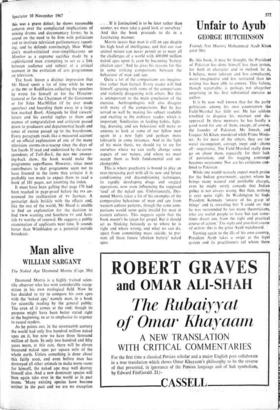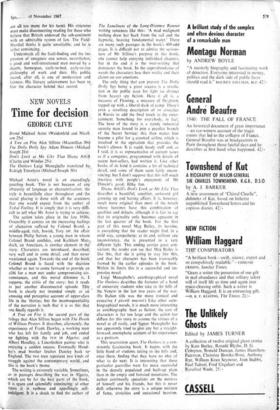Unfair to Ayub
GEORGE HUTCHINSON
By this book, it may be thought, the President of Pakistan has done himself less than justice, for both in character and in outlook he is, I believe, more tolerant and less complacent, more imaginative and less restricted than his writing has been able to convey. This failure, though regrettable, is perhaps not altogether surprising in his first substantial exercise its author.
It is by now well known that for the party politicians among his own countrymen the Field-Marshal has little use. He has seldoin troubled to disguise his mistrust and dis- approval. In these memoirs he has hardly a good word for any of them, except, of course, the founder of Pakistan, Mr Jinnah, arid Liaquat Ali Khan, murdered while Prime Minik- ter. As for most of the others, they are (or were) incompetent, corrupt, inept and—above all—unpatriotic. The Field-Marshal really does go on about them, especially for their la& of patriotism, and his nagging contemjit becomes wearisome. Nor arc his criticisms con- fined to Pakistan.
While one would scarcely expect much praite for the Indian government, against whom he brings many natural and justifiable charges, even he might surely concede that Indian policy is not always wrong. But then, nothing is ever quite right. In Washington he fit* President Kennedy 'unsure of his grasp of things' and (a revealing bit) 'I could see that he was surrounded by too many theoreticiatts, who are useful people to have but can some- times divert one from the right and practical course of action.' The right and practical course of action: this is the great Ayub watchword. '
Turning again to the ills of his own country, President Ayub takes a swipe at the legal system and its practitioners (of whom theta
are all too many for his taste). His strictures must make disconcerting reading for those who believe that Britain endowed the sub-continent with an admirable system of law. -The Field- Marshal thinks it quite unsuitable; and he is rather convincing.
Underneath all the fault-finding and the im- pression of smugness one senses, nevertheless; a good and well-intentioned man moved by a decent, homespun, early-to-bed, early-to-rise philosophy of work and duty. His public record, after all, is one of moderation and fairness. His literary achievement has been to blur the character behind that record.







































 Previous page
Previous page